My father Shri Roshan Lal Seth passed away 40 years back, on 2nd January 1978. A self evasive, noble freedom fighter of India and humble to the core patriot, whose children came to know about his revolutionary days from the condolence messages of his friends and associates after his death. It was an era, when people did not attribute all their actions to themselves, they strongly and with full conviction, believed in a superpower and what ever they did they attributed it to that power called God or Nature. Thus politics and work life was clean as they were not trying to encash every good action with money or fame as they believed that they were not doing anything special, it was either their social and moral duty or God who was doing it. How much has the world changed today. It is a peacock generation. Every miniscule achievement, or even when we sneeze, we want to share with the world through Facebook, whats App, Instagram, Twitter, Linedin, and anxiously count how many people have Liked. Appreciation has become like a ‘shagun’ you like my post I like yours even when we feel nothing. I am giving a very interesting excerpt on revolutionary activities of my father Roshan Lal Seth, from my uncle, Mr Pran Seth’s book, Lahore To Delhi, which makes a very interesting and meaningful reading. Mr Pran Seth, a great incisive writer who has nearly two dozen research based very interesting books to his credit writes:
which makes a very interesting and meaningful reading. Mr Pran Seth, a great incisive writer who has nearly two dozen research based very interesting books to his credit writes:
‘I began to have some understanding of the concept of ‘Inquilab Zindabad’, the slogan of freedom movement, in early 1930s, when our house, in Lahore, was raided by 50 odd sturdy Punjab policemen. Not only had they surrounded our little house from all directions, they stood guard at the exit points of the street. They were looking for my brother Roshan. I always admired this khadi-clad unemployed graduate for his loving disposition towards me and his excellent physique.
My brother was usually not at home with the good excuse that he was looking for a job. A B.A. from the elite Forman Christian College of Lahore, he was a very busy member of our family. Unlike other members, Roshan was always immaculately dressed in white khadi churidar and a kurta. In the evening when he went to the playground, he was dressed in khaki half pants and a shirt and with a hockey stick hung on the back of his bicycle. He had many friends who wore khadi and came visiting frequently though they always seemed to be in a hurry.
My father was in his little shop from morning till night. They usually did not meet each other and whenever they came face to face, my father’s only question was, “Any success on job front? Have you applied?” Roshan was invariably calm and composed while replying. Unemployment was a major problem in India in the thirties with the world-wide depression. India had hardly any domestic industry which could make use of the educated unemployed. Their only avenue was to get a job with the government and those openings were scarce, especially for khadi-clad people who were expected to be against the British Raj. Khadi symbolised anti-British attitude.
A police raid at the Seth residence was a very unusual incident, with our reputation of being decent, law-abiding citizens. While family members gathered with concern, neighbours crowded around to see “the fun.” My mother did what she was best at. She cried. I had never seen police in such large numbers and quietly ran out to be with the onlookers. The neighbours pondered over every possible crime (dacoity, murder, theft) which the young Seths might have committed. No one suspected that one of the Seth children could be a revolutionary!
After about an hour, the crowd got closer to the truth. Police had suspected that some revolutionaries were meeting at Roshan’s residence and they hoped to catch them. As I moved from one group to the other, I heard several versions of the purpose of this meeting. Overall, I was impressed by the role, my brother was playing in the freedom movement but the story which appealed to me most was that Roshan was conspiring to kill the British Officers in India!
The Punjab police were not known for their civil behaviour. I remember my brother asking them to produce a search warrant. Since they had brought a magistrate along, my brother let them search all corners of the three-storey house while he chatted with the magistrate in English (much to my pride). The operation continued for over an hour. They opened our suitcases, threw clothes on the floor, and opened utensils, and jars in which we stored our lentils or wheat flour. They ordered my mother to sit in one corner and not to interfere in anything. Almirahs, cupboards, wall-hangings, storage, and garbage bins were also ransacked but nothing was found.
Amongst the romantic novels my brother read, they found no pamphlet on Karl Marx or Lenin or any other literature. They could not charge him for sedition and take him to the police station to question which was the way they normally dealt with other young people. Besides, my brother had established a friendly rapport with the Indian magistrate who turned out to be another old boy from the Forman Christian College, and it seemed to have helped him. My father wasn’t around at that time. My brother was questioned at length but the police obviously found nothing to charge him with. No ‘revolutionary’ group was discovered or caught in the house. It was a normal middle-class house. Only a few new chairs and an office table in Roshan’s ground floor room indicated western influence. Before leaving, the magistrate shook hands with my brother. The onlookers and spectators were highly impressed and Roshan’s status among our fellow citizens shot up.
It was now the turn of the assembled crowd to approach my brother, making friendly and sympathetic noises, some even abusing the Punjab police for their ruthlessness and cruelty. He gave them a polite reply with a smile on his face and told them the police had come to a wrong address. He was not the Roshan they were looking for. He told them that he was no revolutionary nor did he have revolutionary connections. He was an honest Congressman who followed Mahatma Gandhi’s nonviolent path. The crowd was a little disappointed and melted away.
In the evening when the family sat down for dinner, we discovered that Roshan did have some connections with revolutionaries. He dug out from one of the walls two imported pistols with a supply of cartridges and showed them to us. He revealed that these pistols were concealed in the house two days back by his friends. He did not tell us which revolutionary group he belonged to, but apparently, he was at the core of a group who trusted him and considered his house safe. Next morning, the pistols were out of the house. The police, it seemed, had the correct information. Some revolutionaries had been meeting Roshan. However, they did not find any evidence. The pistols were in a well camouflaged corner. That saved my brother.
Just a few months before this incident, Bhagat Singh and two of his colleagues Rajguru and Sukhdeva were hanged and cremated on the banks of the Beas River. That news came at midnight and I recall most elders of our family leaving home to join the protest on the streets of Lahore. People were wailing, cursing the British Government; slogans like ‘Long Live Bhagat Singh’ rent the air. Roshan was among those who stood outside the Lahore Jail through the night awaiting the bodies of the three revolutionaries to be handed over to them, but coward British Government had smuggled out the bodies in the darkness from the back door of the jail and cremated them on the banks of river Beas several miles away from Lahore. The protests continued for a few days, but the children chanted the Bhagat Singh slogans for years. He became the symbol of the Indian freedom and the revolutionary movement in Punjab. I, too, was painting the house and the street with the new slogans in Urdu in memory of Bhagat Singh; we called him, Shaheed-e-Aazam, the great martyr.
To get him away from his revolutionary activities, my father took Roshan to a village, 40km from Lahore. In this village, my father had leased a water mill where wheat flour was manufactured. The grinding wheels of the mill were powered by the electricity generated by water in the canal that flowed by. Scores of farmers would come to the mill every day to get their wheat ground or to sell their wheat to my father. Roshan started spreading his message of freedom among the farmers too. This really worried my father as his mill was leased from the government and the lease could easily be revoked. He decided to take Roshan back to Lahore.
I recall going with Roshan for a walk in the village. I was walking behind him, and he asked me why so. I told him that our teacher had told us to follow our elders. He laughed, and pulled me up to him and said, “You walk with me straight with your head high. Children of free India must walk with their heads high and erect and never bend before anyone in authority. I followed his advice literally and in Lahore, while going to school, I would walk with my head up and eyes straight. One day, I stumbled on a stone and fell down on my head!
We noticed another interesting aspect of my brother during a Satyagrah movement in the early thirties, groups of volunteers courted arrest daily in Lahore, for which organisation was needed, and we came to know that brother Roshan was the organising spirit behind it, much to the chagrin of British authorities who were puzzled that when they had arrested all the top leaders how the protest marches were being organised every day. The strategy was, at a given time, some Congressmen would gather to move forward in a procession shouting anti-British slogans. Slogans became louder with every move forward. Roshan led the group as well as the sloganeers. He would start the procession with the flag in hand and continue marching forward. Enthusiastic volunteers tried to snatch the flag from Roshan but he would not yield till they reached the place where police usually made arrests. And, he would vanish handing over the national flag to someone else who was keen to grab it. Although it was a daily affair, my brother was never arrested and he was always there next day to lead the Satyagrah. He shouted the loudest. One day, I asked him why he evaded arrest while others went to jail. My brother smiled and told me that someone has to prepare volunteers to court arrest every day. “I and some of my co-workers do that job. I have to lead the procession and set the tone and pace. During the excitement fired by patriotic slogans, others join in the group and take the lead. And, at the right moment, I let them lead the batch to court arrest. I go back to prepare the next batch of Satyagrahis at the Congress office. Otherwise, the movement may sag,” he said.
In February 1928, a committee from England, called Simon Commission visited India, with the aim of deciding how much freedom and responsibility could be given to the people of India. But there was no Indian on the committee. This angered Indians and they decided to boycott Simon Commission, while the government was busy whitewashing the walls of Lahore to welcome the Commission. The night before the visit Roshan with his two other revolutionary friends went about painting the newly whitewashed walls with coal tar. He took a tonga and the exercise continued for the whole night. In the early hours of the morning he vanished before police could wake up to see what Roshan had done to their welcome arrangements.
He was a grassroots level dedicated worker. Roshan was one among the organisers of a meeting on the banks of Ravi on January 26, 1930. It was at this meeting Pandit Jawaharlal Nehru gave the first call for Purna Swarajya or complete Independence and hoisted the Indian flag. Roshan was also in charge of the security and other arrangements for Pandit Nehru.
After independence, he worked tirelessly around the clock for the resettlement of Hindus and Sikhs who had shifted to Jullandhar from the newly formed Pakistan. Though he was in charge of settlement of claims and allotment of houses to the people who came from Pakistan, he never took any house for himself and lived most of his life in a rented house.
Three decades after independence, the Government of India decided to honour freedom fighters with Tamrapatras (certificates). Roshan refused to attend the meeting where they were to be honoured on the ground that he did not participate in the freedom movement to claim recognition or an award. However, The Deputy Commissioner of Jullandhar city, where Roshan then lived, came to his newspaper office and left the Tamrapatra on his table while he was away. Later, the freedom fighters were allowed pensions and free rail travel. Roshan never put in a claim. He never mentioned these honours to me, and I came to know about them long after his death from one of my friends in Jullandhur.’
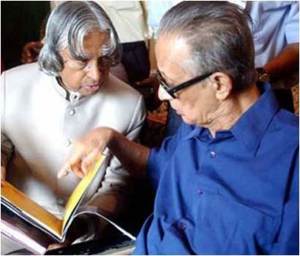


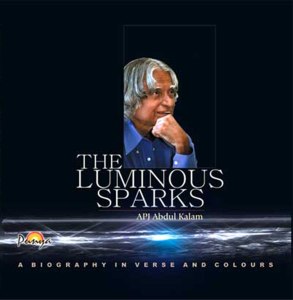
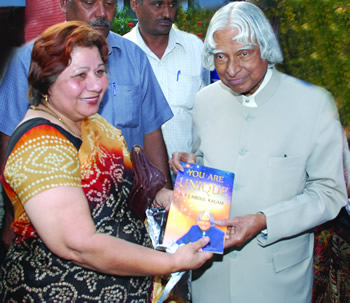
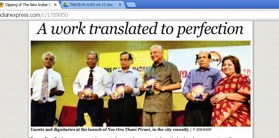
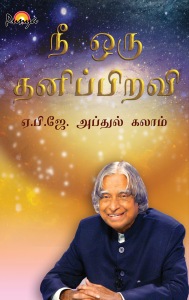


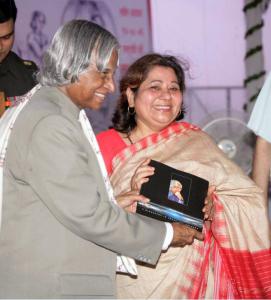
![you-are-unique-release[1]](https://poonamskohli.files.wordpress.com/2015/08/you-are-unique-release1.jpg?w=300&h=260)

![you-are-unique-release[1]](https://poonamskohli.files.wordpress.com/2015/07/you-are-unique-release1.jpg?w=300&h=260)